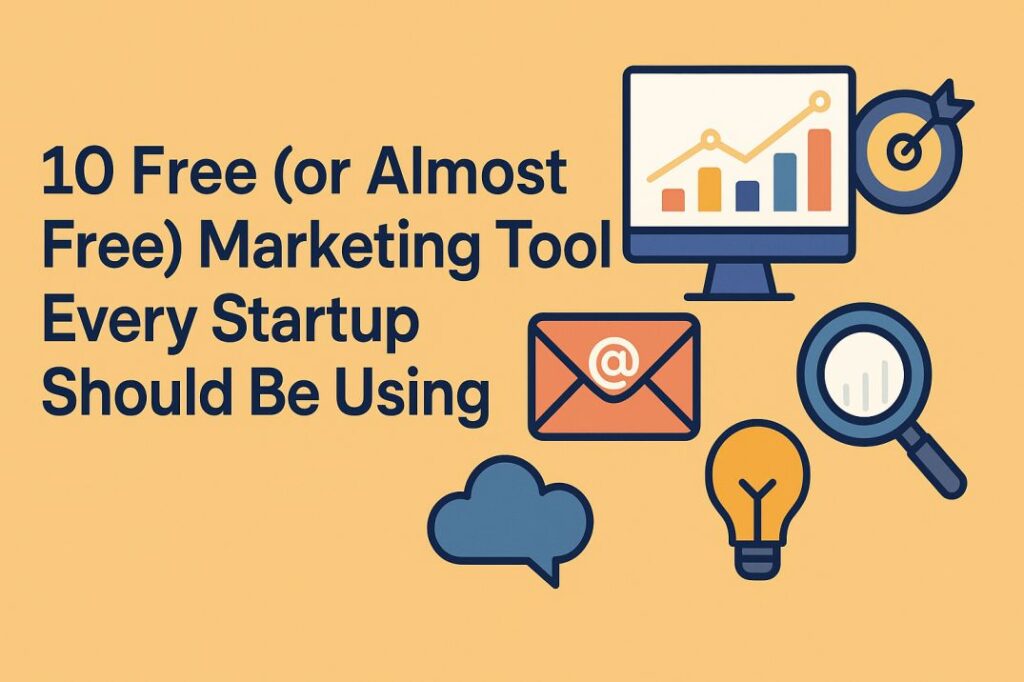So, you’ve got a killer business idea, a lean team, and a budget that looks like your morning chai bill. Welcome to startup life! It’s thrilling, fast-paced, and often a little overwhelming—especially when it comes to marketing.
But here’s the good news: You don’t need deep pockets to market like a pro. There are dozens of tools out there that are either free or nearly free, and they pack a serious punch when used right. We’ve curated 10 super useful marketing tools that’ll help you look like a big brand even if you’re running your ops from a coffee shop corner.
Let’s dive in. 🚀
1. Canva – Design Like a Pro Without Being One
What it does: Graphic design made drop-dead simple.
Why you’ll love it: Templates for everything—Instagram posts, reels thumbnails, presentations, business cards, you name it.
Canva is your go-to visual buddy. Whether you’re creating social media creatives, posters, or pitch decks, Canva makes your brand look polished without hiring a designer. Their free plan is surprisingly generous, and if you ever upgrade, it’s still budget-friendly.
✨ Pro Tip: Use brand kits to keep your startup’s look consistent across everything.
2. Mailchimp – Email Marketing for the Win
What it does: Sends beautiful emails to your subscribers.
Why it’s awesome: Free plan supports up to 500 contacts and gives automation tools too.
Even in the WhatsApp era, email marketing isn’t dead. It’s just smarter now. With Mailchimp, you can set up welcome sequences, send newsletters, or launch product update campaigns with ease.
📧 Growth Hack: Add a simple newsletter sign-up on your website or Linktree—build that email list from Day 1.
3. Buffer – Post Once, Chill Twice
What it does: Schedules your social media posts across platforms.
Why it helps: Saves time and keeps your content consistent.
Running multiple social handles? Don’t burn out. Buffer helps you plan your posts, analyze what’s working, and engage with your audience—all from one dashboard. The free plan allows you to schedule up to 10 posts per platform.
🧠 Smart Play: Dedicate one day a week to create and schedule posts—it’s a productivity game-changer.
4. Google Analytics – Your Website’s Truth Teller
What it does: Shows how people are using your website.
Why you need it: Know what’s working, what’s not, and where to improve.
Data is gold, and Google Analytics helps you mine it. Find out which pages attract the most traffic, where users drop off, and which blogs or products convert best.
🔍 Insight Tip: Track events like button clicks and form submissions to measure real engagement.
5. ChatGPT – Your AI-Powered Marketing Assistant
What it does: Writes content, ideas, captions, emails, ad copy… basically everything.
Why it rocks: Saves time, sparks creativity, and works 24/7 (no chai breaks needed).
Whether you’re stuck writing product descriptions or planning a blog strategy, ChatGPT can help brainstorm, write, and refine. Just remember: You’re the boss. Use it as a tool, not a crutch.
💡 Idea Spark: Ask ChatGPT to help repurpose one blog into 5 social media posts. Magic.
6. Ubersuggest – SEO Without the Headache
What it does: Finds the best keywords and helps improve your SEO.
Why it’s gold: Simple, visual reports on what people are searching for.
Run by marketing legend Neil Patel, Ubersuggest is like having an SEO consultant on speed dial. The free version gives decent access to keyword ideas, traffic estimates, and even competitor analysis.
📈 SEO Trick: Use long-tail keywords to rank faster with less competition.
7. Notion – Organize Everything Like a Genius
What it does: Combines docs, task boards, wikis, and calendars.
Why it matters: Keeps your marketing life (and team) organized and stress-free.
Marketing involves campaigns, deadlines, content calendars, and a gazillion ideas. Notion lets you create one workspace for it all.
🛠️ Hack: Use Notion to plan a 30-day content calendar with links, assets, and status updates.
8. Pixabay – Free Images That Don’t Suck
What it does: Gives access to high-quality, royalty-free photos and videos.
Why it’s better: You won’t get stuck using the same 3 stock photos everyone else does.
Whether you need a mood-setting background, hero image for your website, or filler visuals for a blog post, Pixabay’s got your back—for free.
📸 Visual Pro Tip: Stick to a specific color scheme to keep your feed looking like a million bucks.
9. AnswerThePublic – Know What People Are Searching For
What it does: Visualizes real questions people ask on Google.
Why it’s useful: Helps you create content that answers actual user needs.
This tool is genius for planning blog posts, FAQs, and even product ideas. Type in a keyword, and it gives you a spider chart of questions and phrases real people are searching for.
🤔 Content Idea: Search for terms like “best fitness tracker” or “how to start a blog” to find angles your competitors missed.
10. Google My Business – Be Found Locally
What it does: Lets people find your business in Google Search & Maps.
Why it’s important: Boosts local SEO and helps you show up when people search for services “near me.”
Even if you don’t have a storefront, you can set up a service-based profile. It’s free visibility, reviews, and credibility—all rolled into one.
📍 Power Move: Keep your profile updated with photos, services, and customer replies.
The Bottom Line
You don’t need a marketing agency or a fancy MBA to market your startup like a champ. With these 10 free or low-cost tools, you can build your brand, grow your audience, and look incredibly legit—all while staying under budget.
Remember: It’s not about doing everything, but doing the right things consistently. Start small, experiment, and double down on what works. And most importantly, have fun with it—because the journey is half the story.

